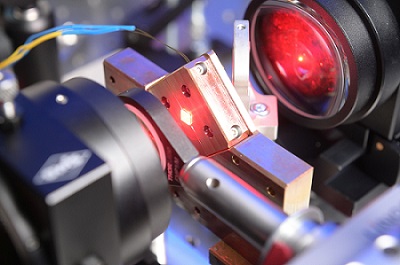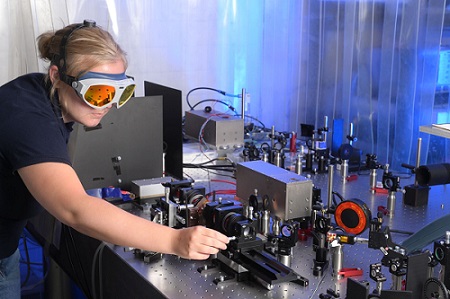Under the European Horizon 2020 project GALACTIC, partners Laser Zentrum Hannover (LZH, Germany), Optomaterials (Italy), and Altechna (Lithuania) have established a European supply chain to produce alexandrite laser crystals used in space applications.

The alexandrite crystals from the GALACTIC project were grown by Optomaterials and coated by Altechna to withstand the harsh conditions in space. Courtesy of LZH.
Alexandrite crystals have robust thermal conductivity and fracture strength, properties that make them well suited for use in high-power laser systems and in space-based applications. Because the crystals can be used to tune the output wavelength of laser systems, they could form the basis of new types of laser-based measuring instruments for Earth observation satellites. These instruments could be used to collect more precise climate-relevant data on the state of the atmosphere or vegetation.

Using a specially developed laser system, the team at LZH has tested the alexandrite crystals from European production for competitiveness. Courtesy of LZH.
Optomaterials produced the crystals for the collaborative effort. The Altechna team then coated the crystals using coating designs and processes based on ion beam and magnetron sputtering. Researchers at LZH tested the crystals by exposing them to proton and gamma radiation and ran them through several temperature cycles typical for space applications. Before and after these tests, the crystals were characterized in terms of their transmission properties and laser performance, among other things.
Since the environmental tests did not significantly change the measured parameters, the crystals have been deemed suitable for space. Additionally, the researchers showed that the laser-induced damage threshold (LIDT) of the crystals is equal to — or even exceeds — top products on the world market.
Through these efforts, the GALACTIC team has raised the Technology Readiness Level (TRL) of space-qualified alexandrite crystals from Europe from 4 to 6 and have made the crystals ready for the market.
The research was published in Optics Express (www.doi.org/10.1364/OE.478628) and presented at the Optica Interference Coatings Conference 2022.